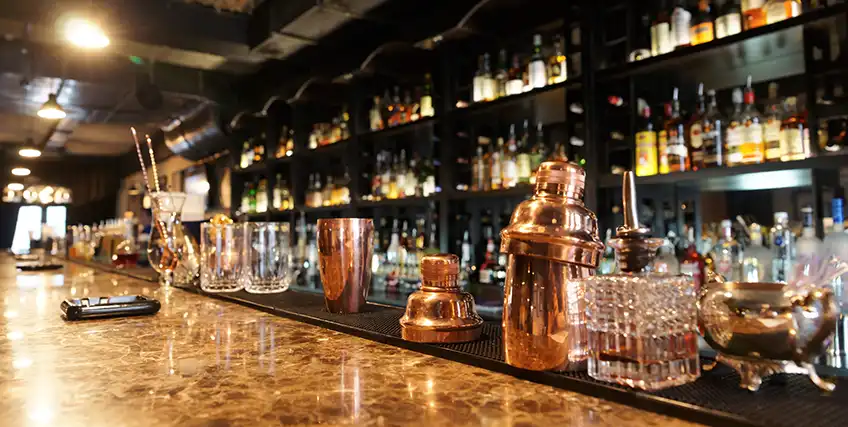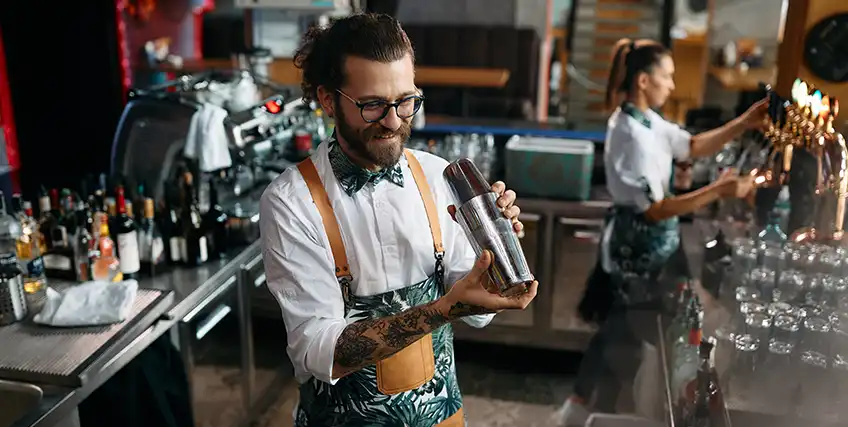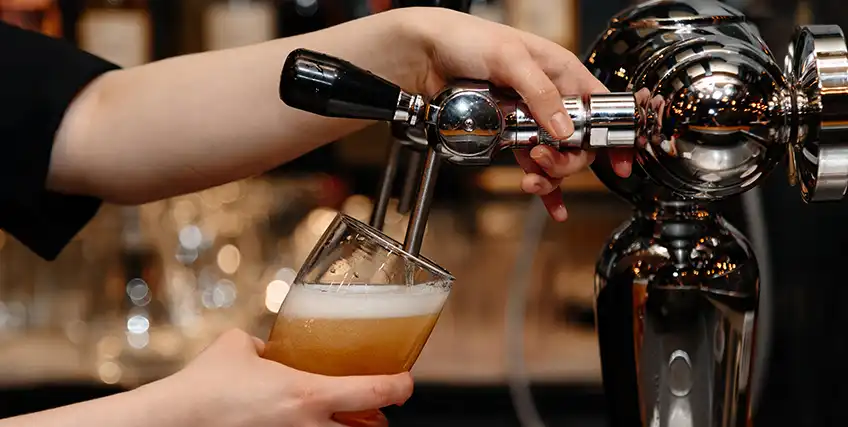How Much Does it Cost to Start a Mobile Bartending Business?
April 01, 2025 | Last Updated on: April 02, 2025

Many people dream about owning their own bar. Serving alcoholic beverages while executing a business model you've dreamed about is the gold standard for some entrepreneurs. However, starting a bar is extremely expensive, with some estimates suggesting it costs up to $850,000. With small businesses reporting slow earnings in 2025, it's in your best interest to reduce costs as much as possible.
Starting a mobile bar business is much more affordable and can save you time and money on necessary licenses, brick-and-mortar costs, and more significant bar costs.
In this article:
- Costs to starting your own bartending service or mobile bar.
- How to start a mobile bartending business.
- How to get funding when starting a mobile bar business.
What is a mobile bartending business?
Mobile bar businesses are essentially bars to go: For a set price, event planners can bring the whole bar to the party. Unlike a traditional bar, a mobile bar won't have to endure expensive, slow nights of paying for food service and staffing costs because you'll only operate when you have bookings.
Mobile bars are usually hired for corporate events, weddings, private parties, pop-up festivals, and other types of events, allowing entrepreneurs to manage costs better. When you're booked at an event, you know you'll have a crowd and can always ensure at least your basic operating costs are covered.
Because of the relative ease of setup, low startup costs, and straightforward business plan, starting a mobile bar business can be a smart investment for a savvy business owner. The mobile bar industry is growing and starting your own bartending service can be a great first step to eventually opening a brick-and-mortar bar.
How to start a mobile bar business
Starting a mobile bar business is less complicated than a brick-and-mortar bar, but that doesn't mean it's easy. There are still a number of important steps you must take to ensure you understand the market, licensing requirements, and operating particulars.
- Conduct market research: A successful mobile bar understands its market. You'll need to determine if there is a demand for mobile bars at local events and venues by networking and exploring the competitors that already exist.
- Create a business plan: From figuring out your customer base to how you'll provide the best customer experience, your business plan should outline what makes your mobile bar unique and how you’ll grow it to the next level with your marketing strategy.
- Obtain necessary licenses and permits: Different states and local governments may have varying legal requirements for alcohol sales. Before you get started, make sure you contact the health department and licensing boards to comply with local liquor laws and get proper alcohol licensing and other necessary permits.
- Acquire proper equipment: This may depend on your business model, but generally, you’ll need a few bar stands, glassware, storage, a point of sale (POS) system, disposal options, and a means of transportation.
- Develop a menu: You may want to allow customers to create their own menu for an event, but it's always a good idea to have a dedicated menu to fall back on if they can't decide what they want.
- Establish supplier relationships: Alcohol service is expensive, and your suppliers can make a big difference. Building strong, lasting relationships with suppliers can save you a lot of money in the long run.
Costs for a mobile bar business
Starting a mobile bar business is relatively inexpensive, but they're not without costs. You'll still need to budget for a range of startup costs and operating costs. Fortunately, Mobile Bev Pros estimates that starting a mobile bar business may cost less than $5,000.
Branding
Branding is a key component of any marketing strategy and is essential to getting positive word-of-mouth advertising. From the sign on the front of the bar to the business cards, great branding is consistent across every platform.
For example, WolfPig, operating out of Denver, Colorado has an instantly memorable name, and it operates out of a classic '57 Ford with earthy-looking wood paneling in the back and a full list of suggested signature cocktails. Their social media presence is evocative of their base of operations: mountains, open roads, and the outdoors.
A mobile bar can be almost anything, from a tiki bar on wheels to a luxury cocktail bar. Know what you want your bar to be, and the clients will follow. But be aware that some types of branding will be more difficult and more expensive to pull off.
Bar and equipment
The most important startup cost is the bar itself. And the bar can be anything. In Austin, Texas, the Speakeasy Mobile Bar is built into a chrome 1960s Airstream trailer, giving an intimate speakeasy vibe with seating available. Also in Texas is Trucky, a farm van turned bar. The possibilities are endless. Ice cream trucks, RVs, and even pickup trucks will work. Alternatively, some mobile bar businesses opt for a more traditional bar, but one that is easily broken down and transported in the back of a vehicle. These sorts of mobile bars are easily set up and taken down, giving even further flexibility.
Starting a mobile bar business requires that you also give it the right decor. The above examples have been tastefully decorated to create enticing, photo-worthy mobile bars. (After all, social media can be an excellent marketing resource.) Some mobile bars also provide seating. You might consider buying an outdoor sofa or dining set so that your guests have somewhere to relax while they sip your cocktails.
Moreover, you'll need bar equipment to make those cocktails, which may require mixers, shakers, measuring equipment, bottle toppers, muddlers, and containers for garnishes. You may also need refrigerators, blenders for frozen drinks, and piping if you plan to serve beer from kegs.
Permits and Insurance
As with many new businesses, there are legal issues associated with opening your own business. A cocktail bar on wheels is no different. You'll need to pay for liquor liability insurance to protect you from financial liability in any lawsuit related to consuming alcohol. You should also have coverage if a partygoer damages your bar. These insurance policies can cost hundreds per year but protect you in the case of an inebriated person getting hurt.
You'll also need to create a legal entity for your small business. That means creating a business bank account, registering for taxes, setting up accounting software, starting a website, and more.
Starting a mobile bar business has more hurdles than some other industries, but you'll be happy that you took the time to ensure legal and regulatory compliance.
Staffing
Every bar needs competent staff. There's more to bartending than knowing a Tom Collins from a Gin Rickey. Bartenders need to know how to manage customers, whether that's cutting them off or stopping them from starting a fight at the event.
How to get funding for a mobile bar business
Starting a mobile bar business usually isn't exorbitantly expensive. Still, you may not have the personal funds to get your idea off the ground. That's where small business loans and other funding options come into play.
You probably don't need a very large loan amount, but some good options to explore include:
- Term loans: Traditional term loans may be both long- or short-term, with smaller amounts usually having shorter terms. A small upfront lump sum payment may be enough to get your business through the first few months, and you can repay the loan plus interest with monthly payments.
- SBA Microloans: The U.S. Small Business Administration (SBA) offers several loan programs, but the Microloan is likely the best option for your business. These loans are for amounts under $50,000 and offer competitive interest rates and repayment terms for applicants with good credit.
- Angel investors: Getting investment in a business keeps you out of debt and allows you to pay investors out of profits rather than being on the hook for monthly payments. Angel investors are usually friends, family, or local community members with deep pockets who are interested in helping you get your business off the ground because they believe in its mission. Starting a mobile bar business isn't particularly expensive, so with strong market research and a good business plan, you may be able to convince an angel investor to offer up to a few thousand dollars in startup funds.
Final thoughts
Starting a mobile bar business is less expensive than starting a brick-and-mortar bar. Nonetheless, you'll still have some of the same costs and many of the same business challenges. Your upfront investment is relatively small in comparison, but with similar smart branding, a great product, and bar service know-how, you can turn a portable bar into a lucrative long-term moneymaker.
FAQs about starting a mobile bar business
How much does it cost to open a bar?
Toast estimates suggest that it costs anywhere from $110,000 to $850,000 or more to start a bar.
How much is starting a mobile bar business?
Starting a mobile bar business is much less expensive than starting a stationary bar, with Mobile Bev Pros estimating that it could cost less than $5,000.
What are the startup costs for a mobile bar?
Although you won't have to pay rent or decorate a full bar, you'll still have costs associated with transportation, staffing, liquor inventory, and marketing.
How to start a mobile bartending business?
To start a mobile bartending business, you'll need to:
- Conduct market research
- Create a business plan
- Obtain necessary licenses and permits
- Acquire proper equipment
- Develop a menu
- Establish supplier relationships
Do you need to get a license for a mobile bar?
Yes, mobile bartending services require proper licensing. Many states refuse to grant liquor licenses to mobile bartending businesses.
Before starting a mobile bar business, it's imperative that you research state and local regulations to ensure you get the necessary permits and observe all local liquor laws.




